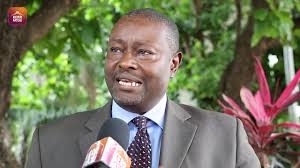The National Human Rights Commission Chairperson Reaffirms their Role as Rights Defenders

By Arfang M.S. Camara
Today, the National Human Rights Commission (NHRC) presented their 2019 Activity Report at a conference with the Media.
Speaking at the ceremony, the Chairperson of the Commission, Emmanuel Daniel Joof, has stressed that they do not invent rights, rather they uphold rights that are in the constitution, treaties and conventions that the Gambia ratified and is a party to.
He stated that their commission looks at all gammons of rights: economic, social, civil, political and developmental, noting that the promotion of these rights is what they champion as a national institution.
He reiterated that the human rights they protect are those that are enshrined in Chapter 4 of the 1997 Constitution, noting that there is a whole chapter in the Gambia’s constitution on fundamental human rights and freedom.
“So we take our cue from those rights and these are the rights we talk about and advise the government on. These are the rights that are also enforceable. Apart from those rights, we all know that no country lives in isolation. The Gambia government is a party to many international and regional human right conventions and treaties,” he informed.
The Chairperson also explained the mandate of the commission, stating that the National Human Rights Commission’s mandate is to advise the government to check the existing laws of the country and to ensure that they are in conformity with their international obligation.
“We have started doing our advisory notes. We have been advising the government to look at laws and policies that need to be developed and enacted in accordance with international and regional human right standards.”
He added, “When we talk about human rights which the NHRC upholds, we are talking about fundamental rights and freedoms such as economic, social and cultural rights, civil and political rights. For example, today we talk about our respect for civil liberties- including right to fair trial, peaceful assemblies, freedom of expression- and these are the rights that we stand for, advocate and promote by raising awareness.”
For his part, Njundu Drammeh, one of the commissioners, explained that they focused on 20 human right areas and have so far made about 91 recommendations to the state on various aspects of civil and political, economic and social rights and persons with disabilities amongst other areas of right.
“We have made 91 recommendations on various human rights and they have not been repeated. These recommendations are a monetary framework that at the end of 2020 the media would hold us and the state accountable for their implementation” Njundu said.


Comments are closed.